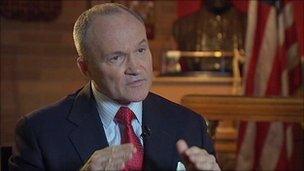New York police chief warns of 9/11 threat
- Published
Rare access to the NYPD to see how it has evolved to face terror threats
The head of police in New York has told the BBC that he is worried that al-Qaeda may attack the city on the 10th anniversary of the 9/11 terror attacks.
Commissioner Raymond Kelly said documents in the compound in which Osama Bin Laden was killed revealed plans for attacks marking the event.
He also said police believe that terror groups may be conducting reconnaissance of New York "on a daily basis".
The warning came as the BBC gained rare access to New York's security planning.
'Top US target'
A service will be held on the site of the World Trade Center on Sunday. The ceremony marking 10 years to the day since the New York and Washington terror attacks in which almost three thousand people died will be attended by US President Barack Obama and former President George W Bush.
A special security zone is being set up near the site and across the city thousands of extra police officers will be deployed.
Speaking to the BBC in the run up to the anniversary, Commissioner Kelly said that New York remained the top terror target in the US:
"We are worried specifically about something happening on the anniversary of 9/11 because we saw on some of Bin Laden's materials that there was discussion about the 10 year anniversary, the 10 year memorial."
"There is no doubt that New York is safer now than it was 10 years ago, but there are no guarantees. We don't know what we don't know and we are doing everything that I believe we can do to protect the city, but it is a dangerous world," he added.
Show of strength
Commissioner Kelly took over as head of New York's police force soon after the 9/11 attacks and immediately set about transforming the force so that in the future protection of the city would not fall to other agencies.

Commissioner Kelly says there is a myriad of evolving threats
A counter-terrorism bureau was created, intelligence experts from the CIA were drafted in and hundreds of heavily armed officers working in teams known as Hercules began to be deployed on the streets.
Both NYPD and the FBI use undercover officers and a network of informants to try to disrupt attacks while they are still in the planning stage.
And three times a day "surges" take place across New York as police officers join an exercise which is part emergency drill, part show of strength - in which dozens of police vehicles from every precinct converge on a designated location at high speed.
Officers gather in the streets to be assigned their duties, all under the control of a mobile command post nearby - a high intensity form of policing designed to keep the public on their toes and send a strong message to those who may be plotting to attack New York.
Commissioner Kelly told the BBC that there is a myriad of evolving threats: "We're concerned about explosives, we're concerned about dirty bombs, we're concerned of course about the unthinkable, a full-blown nuclear event".
Watch Gordon Corera and Steve Swann's report on how New York's law enforcement authorities have responded to terror threats in the years following 9/11 on the News at 10 on BBC One and Newsnight on BBC Two at 10.30pm.